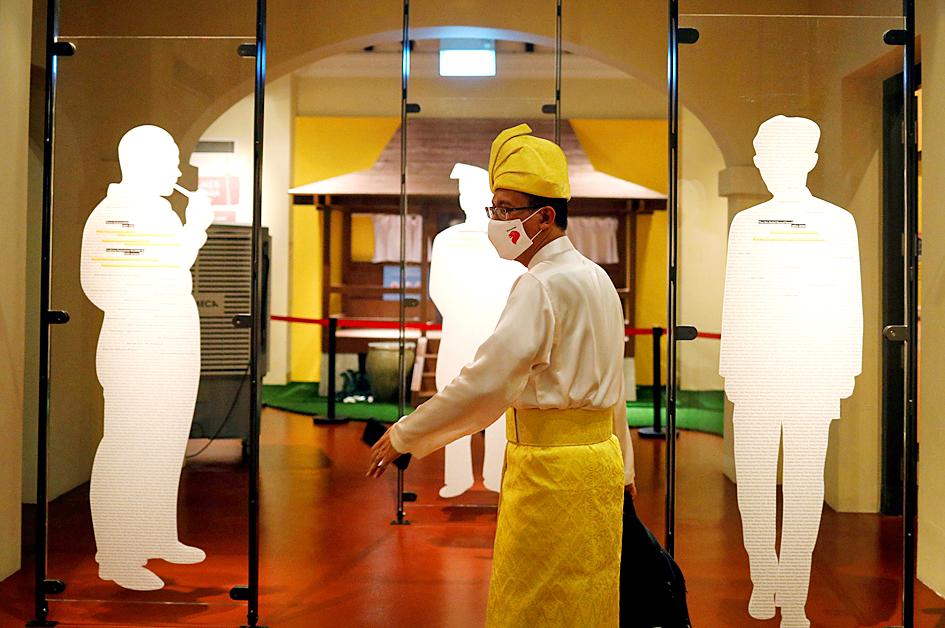In the modern republic of Singapore, several seemingly ordinary people working in offices or driving taxis can claim to be of royal blood, descendants of a 19th-
century monarch who ceded control of the Southeast Asian island to the British.
However, few residents in one of the world’s most cosmopolitan cities are even aware of this lineage, a sore point with Tengku, or Prince, Shawal, acclaimed by some members of his family as “head of the house of Singapore.”

Photo: Reuters
“They still exist?” is a response the 51-year-old said he often receives when he tells people he is one of the descendants of Sultan Hussein Shah — whose treaties with the British led to colonial rule and the founding of the modern country.
Shawal is one of several Singaporeans who bear the honorific name tengku, meaning prince or princess in Malay, and claim links to the sultan.
Until the turn of this century, some of them still lived in their ancestral home, a crowded, dilapidated palace, before they were evicted by the government, which turned it into a museum.

Photo: Reuters
Seventy-nine descendants, of whom 14 were living in the palace, were offered payouts as part of colonial-era deal to provide for the sultan’s family, the government said at the time.
Many of the others were living overseas, it said.
The legal beneficiaries’ names were not made public, making it difficult to verify royal claims.
The Singaporean government, which has ruled unbroken since the city-state’s independence in 1965, said that all but one of the payments have been made, but it was unable to share more details on the beneficiaries.
Shawal, who showed Reuters government correspondence identifying him as a beneficiary, still regularly visits the palace-cum-museum and its nearby mosque and cemetery, in the city-state’s Malay heritage enclave called Kampong Glam.
Despite facing personal issues with his income cut and his logistics job at risk due to the COVID-19 pandemic, Shawal said he devotes time to keeping the sultan’s heritage alive by dressing in traditional royal costume and attending celebratory events.
However, gaining wider recognition is a challenge, even among a disparate and somewhat divided band of claimants.
Other descendants warn about the dangers of living in the past or are too preoccupied with hardships of the present.
“We are not a dynasty. It is not important whether you are a descendant of the royal family or not,” said Tengku Indra, a 67-year-old consultant who lived in the palace grounds as a child.
“What is crucial is you must earn your life through meritocracy instead of enjoying an ascribed status based on ancestral position,” he said.
Indra was described as the great-great-great-great grandson of Sultan Hussein in an article by the government-affiliated heritage society Friends of the Museums Singapore last year.
Indra’s son, 40-year-old businessman Tengku Azan, has a two-year-old daughter who would be one of the youngest descendants.
He thinks future generations would not take much interest in the sultan’s history.
“The past inadvertently takes a back seat and remains uncherished,” he said.
For other former palace residents, life in the outside world has been a rude awakening.
Tengku Faizal, 43, said after he left the palace in 1999 he took a job as a cleaner in a condominium and would get teased for being the prince who handles garbage.
He now drives a taxi, but said he is struggling to make ends meet and has been given financial assistance to cover his daughter’s childcare fees.
To help out, his wife has taken a part-time job in a McDonald’s outlet.
“We are not smart, we are not rich,” Faizal said, speaking in English. “We got title only.”
In Malaysia, a constitutional monarchy where sultans still play an active role in public life, honorific names are far more common.
Of seven Singapore claimants Reuters interviewed, Shawal was the most eager about celebrating his heritage.
However, even he had his own doubts about passing on the “burden” of the royal title and did not give it to his daughter at birth.
Now 27 and working for a biotech firm, Princess Puteri has reclaimed her tengku name, but said she finds explaining her credentials an uphill task in a country that has largely forgotten this piece of history.
“Some part of me feels sad because I need to explain who I am. But the moment when they look at Prince Harry they know he is the prince,” she said.

BACKLASH: The National Party quit its decades-long partnership with the Liberal Party after their election loss to center-left Labor, which won a historic third term Australia’s National Party has split from its conservative coalition partner of more than 60 years, the Liberal Party, citing policy differences over renewable energy and after a resounding loss at a national election this month. “Its time to have a break,” Nationals leader David Littleproud told reporters yesterday. The split shows the pressure on Australia’s conservative parties after Prime Minister Anthony Albanese’s center-left Labor party won a historic second term in the May 3 election, powered by a voter backlash against US President Donald Trump’s policies. Under the long-standing partnership in state and federal politics, the Liberal and National coalition had shared power

A Croatian town has come up with a novel solution to solve the issue of working parents when there are no public childcare spaces available: pay grandparents to do it. Samobor, near the capital, Zagreb, has become the first in the country to run a “Grandmother-Grandfather Service,” which pays 360 euros (US$400) a month per child. The scheme allows grandparents to top up their pension, but the authorities also hope it will boost family ties and tackle social isolation as the population ages. “The benefits are multiple,” Samobor Mayor Petra Skrobot told reporters. “Pensions are rather low and for parents it is sometimes

CONTROVERSY: During the performance of Israel’s entrant Yuval Raphael’s song ‘New Day Will Rise,’ loud whistles were heard and two people tried to get on stage Austria’s JJ yesterday won the Eurovision Song Contest, with his operatic song Wasted Love triumphing at the world’s biggest live music television event. After votes from national juries around Europe and viewers from across the continent and beyond, JJ gave Austria its first victory since bearded drag performer Conchita Wurst’s 2014 triumph. After the nail-biting drama as the votes were revealed running into yesterday morning, Austria finished with 436 points, ahead of Israel — whose participation drew protests — on 357 and Estonia on 356. “Thank you to you, Europe, for making my dreams come true,” 24-year-old countertenor JJ, whose

A documentary whose main subject, 25-year-old photojournalist Fatima Hassouna, was killed in an Israeli airstrike in Gaza weeks before it premiered at Cannes stunned viewers into silence at the festival on Thursday. As the cinema lights came back on, filmmaker Sepideh Farsi held up an image of the young Palestinian woman killed with younger siblings on April 16, and encouraged the audience to stand up and clap to pay tribute. “To kill a child, to kill a photographer is unacceptable,” Farsi said. “There are still children to save. It must be done fast,” the exiled Iranian filmmaker added. With Israel